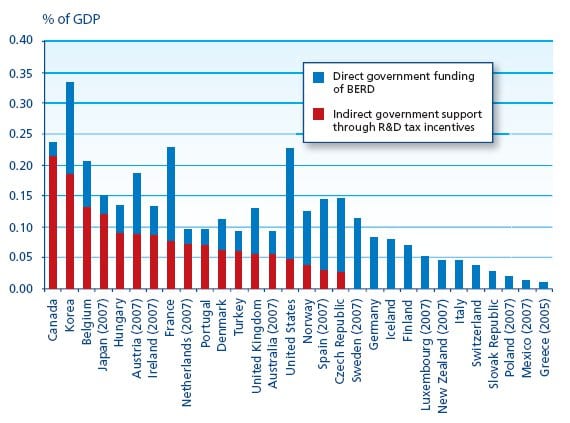Manufacturers in Ontario Half as Likely to Receive Grants from Province
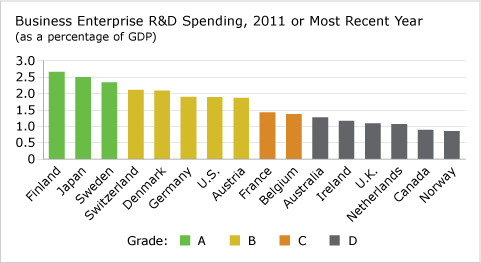
The upcoming release of the Ontario Liberal’s proposed budget renews interest in overwhelming evidence that Canada’s leading provincial economy needs to contribute more to raise Canada’s standing as a cradle of innovation.
According to the Conference Board of Canada research and development spending by businesses (BERD) in Canada has been out-paced by nearly every OECD country, according to the most recent statistics. In addition to relatively low levels of BERD, Canada also ranks poorly in terms of government spending on R&D as a share of GDP, listed well below average at 1.74% of GDP in 2011 trailing countries like Israel which stood at 4.4% and South Korea at 3.8%.
Figure 1, source: Conference Board of Canada
2012 Statistics Shows Innovation in Canada is on the Decline (66.8% to 63.5%)
The Survey of Innovation and Business Strategy 2012, released in the first quarter of 2014 provided evidence to support the obvious: less investment in innovation results in less innovation. The report states that, “between the three-year periods of 2007 to 2009 and 2010 to 2012, the percentage of enterprises that introduced at least one type of innovation went from 66.8% to 63.5%.” What is even more concerning is the specific type of innovation that showed the greatest decline. “Process innovation — the implementation of new or significantly improved production processes or distribution and delivery methods — declined the most. It fell from 33.5% for the 2007 to 2009 period to 29.0% for 2010 to 2012.” The report goes on to add,
“The shift towards organizational innovation may reflect enterprises choosing to reduce their costs by optimizing current operations through reorganization rather than by introducing new logistics, distribution or production methods.”
In a time when pundits are calling for Canadian businesses to capitalize on opportunities in emerging economies scant evidence suggests that businesses have made the investments necessary to compete on the international stage, meaning many of those who are looking to take advantage of the weak Canadian dollar to make their move have their work cut out for them
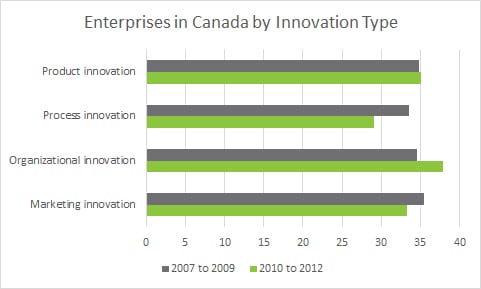
Figure 2, source: Statistics Canada, “Survey of Innovation and Business Strategy, 2012”
Business Owners Weigh in on Crucial Inputs to Innovation
Then business owners across Canada were asked for their opinion on the most critical government programs to support innovation. Interestingly, despite the de-emphasis of the SR&ED tax incentive for research and development program over the past few years, nearly half of business owners offered government tax credits as the most critical public program in support of their innovation activities, up from 34.9% in 2007 to 2009. The importance of government grants fell from 32.3% in 2007 to 2009 to just 17.1% in 2010 to 2012.
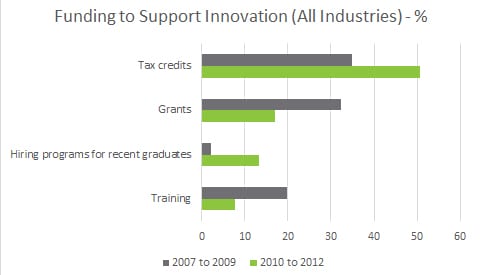
Figure 3, source: Statistics Canada, “Survey of Innovation and Business Strategy, 2012”
Discrepancies in Opinions According to Industry and Region
However, Canada-wide statistics tell only a portion of the story. With differences in regional attitudes toward funding, drilling down statistics by province and industry paints a slightly different picture. And when you look at who is actually accessing federal and provincial grants and tax credits a clearer understanding emerges.
Ontario Firms Favour Hiring Grants while Quebec Firms See Almost No Value in the Programs
One statistic that jumps out at us is the importance of hiring grants and their support of innovation. On average Canadian business owners place the importance of hiring grants nearly on par with other government grant programs (13.4% rate hiring grants of crucial importance, and 17.1% rate government grants as crucially important). Meanwhile 18.5% of firms across Ontario rate hiring grants as a crucial ingredient to innovation, whereas only 1% of Quebec firms agree.
Furthermore, when you look at the manufacturing industries in Ontario and Quebec only 1.5% of Quebec firms and 2.8% of Ontario firms believe hiring grants are of great importance. Another interesting statistic is the difference in importance given to training programs. With businesses across Canada rating “lack of talent” the second most significant obstacle to innovation, only Quebec gives importance to government training programs (16.1%) while Ontario firms largely write off the significance of such support with a mere 4.7% rating it as crucially important to innovation.
Ontario and Quebec Firms Agree on Importance of Tax Credits & Government Grants
Nearly half of all Ontario firms (48%) and 56.5% of Quebec businesses gave tax credits the nod as the most important form of government support for innovation. These statistics were likely influenced by the peak in tax incentives offered by the Federal government during the years leading up to the survey with the Harper government eventually siding with the OECD community in deciding to seek “a more balanced mix of direct and indirect support programs” according to their Review of Federal Support to Research and Development and the subsequent release of their Economic Action Plan in 2012.
Figure 4, source: Federal Government of Canada, “Review of Federal Support to R&D”, 10/2011
Half as Many Ontario Manufacturing Firms Received Provincial Government Grants from 2010-2012
It’s one thing to ask business owners what they think is most crucial to innovation, and it’s another to look at how many firms are actually accessing government support programs including R&D tax incentives and government grants. For example while Ontario and Quebec manufacturing industries both saw just under 20% of their firms access Federal government grants in 2012, only 19.7% of Ontario manufacturers accessed provincial government grants in 2012 compared with 38% of Quebec firms that leveraged provincial government grants set aside for manufacturers. These numbers compare with an average of 24.9% of manufacturing firms that accessed provincial government grants across the provinces of Canada.
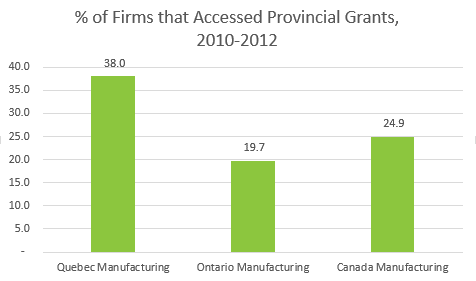
Figure 5, source of data: Statistics Canada, “Survey of Innovation and Business Strategy, 2012”
Province of Quebec Leads Canada in Spending on Research and Development
When national innovation figures were released earlier this year by Statistics Canada we saw headlines similar to years past, “With the exception of Quebec, Ontario leads Canada in terms of spending on R&D.” Although its indisputable that Ontario has the greatest amount of both foreign investment as well as a higher percentage of firms that innovate, Ontario as a province still lags behind Quebec, and Canada as whole is trailing nearly every OECD country. Now with the province of Quebec coming out with an unprecedented budget of $3.7 billion ear-marked for research and development in its 5 year innovation policy, Quebec has pledged to bring its contribution toward R&D up to 3%. This massive contribution will likely put the province on par with leading OECD countries, nearly double Canada’s 2011 contribution, and way ahead of the US which stood at 1.85%. Now the ball is in Ontario’s court.

